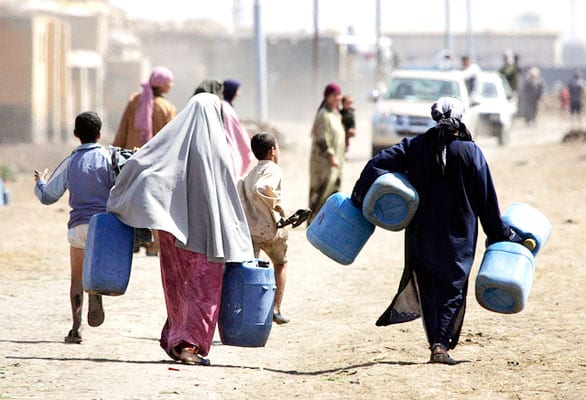

Credit: Nasser Nouri on Flickr, under Creative Commons (CC BY-NC-SA 2.0)
(WOMENSENEWS)–From all the African and Asian data gathered in pursuit of global U.N. targets for maternal and child health it’s sometimes hard to spot what’s going on for women in the Middle East and North Africa, usually called the MENA region.
Current conflicts here threaten women’s rights and constrain access to services. The context of generalized violence also exposes women to gender-based violence and weakens mechanisms to improve women’s status. How does maternal health care fit into this backdrop?
To discuss such issues, regional experts will be gathering at a MENA consultation meeting directly before a global gathering of women’s health researchers and activists at the Women Deliver conference, taking place May 28 to 30.
The pre-conference event will strive to propose workable, sociologically sensitive strategies to improve women’s health and status.
This is the first effort by the Women Deliver organization to position the global spotlight on the MENA region and to draw attention to its specificities in the global women’s health agenda, as well as to its particular importance on the global map.
So far, global efforts have focused on providing skilled attendance at birth and institutionalizing deliveries. The latter has been the main focus in the countries of the MENA region.
If we understand the MENA region better, and the consequences of what we have been doing so far, the progress already made here towards the U.N.’s Millennium Development Goal No. 5, to reduce maternal deaths, could likely be amplified.
And in the process we could also consider the holistic health care needs of women in a region that remains torn apart by violent conflict.
Lagging Quality of Care
In many parts of the MENA region the problem isn’t just a shortage of access to human resources or health services, it’s also the quality of care.
Here we are concerned in some cases about the under provision of care in marginalized and migrant groups and overprovision in more privileged populations. We are also troubled by the quality of care offered in reproductive and maternity services to all women.
The concern about overprovision has been linked internationally to the so-called risk society, where the value of risk is over-rated. This usually leads to a decrease in a woman’s overall well-being because interventions designed to deal with high-risk pregnancy and labor suddenly become over-extended to routine use in all childbearing women. The consequences? Many simple effective practices will lose ground as unnecessary or harmful interventions may become the norm.
For example, simple effective practices such as post-birth counselling on family planning methods are not routinely provided in Lebanon, while all laboring women are induced with or without clinical indications.
This approach to childbearing and childbirth is widespread in Arab countries and has resulted in the over-medicalization of maternity care. The evidence on rising trends of Caesarean sections in many Arab countries, such as rates exceeding 40 percent in Lebanon lately, is one important indication of the failure in delivering optimal care to women in this part of the world.
The over-medicalization of maternal health care is also a serious financial issue because it can mean that regional and national budgets are allocated to personnel training, hospital costs and post-birth care.
In the context of ongoing political turmoil in many of the countries of the MENA region that’s a serious issue to consider.
Women’s eNews is partnering with Women Deliver to spotlight changemakers who are participating in Women Deliver 2013, May 28-30 in Kuala Lumpur, Malaysia. Women’s eNews managing editor Juhie Bhatia will be moderating a conversation on Web-based advocacy, activism and storytelling at the women’s health conference on May 28.
Tamar Kabakian-Khasholian, Ph.D., M.P.H., is an associate professor in the health promotion and community health department of the faculty of health sciences at American University of Beirut, Lebanon.
Would you like to Comment but not sure how? Visit our help page at https://womensenews.org/help-making-comments-womens-enews-stories.
Would you like to Send Along a Link of This Story? https://womensenews.org/story/reproductive-health/130523/mena-womens-health-gets-first-look-at-conference

